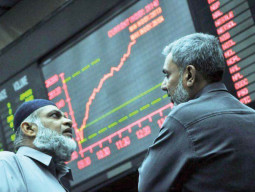
Adviser to the PM on Finance Dr Abdul Hafeez Shaikh on Sunday chaired the third meeting of the government-led ‘Thinktank’ where the participants selected six broad priority domains.
“[These areas include] boosting social safety nets (Ehsas and allied initiatives), food security and safety of supply chains, enhancing the role of banks and financial institutions in appropriately designing incentives for market participants, kick-starting low and medium cost housing projects, making the Public Sector Development Programme (PSDP) and the provincial Annual Development Programmes (ADPs) responsive to labour intensive propositions and business facilitation through fiscal interventions,” read a statement issued by the finance ministry.
Row over wheat purchase persists
Unlike the handout issued after the previous meeting, the ministry was silent on the issue of monetary policy. There was also no mention of inflation that fell to single-digit level in April, creating room for a further interest rate cut.
During the second meeting, some members of the Thinktank had called for further slashing the interest rate to mitigate the impact of the pandemic.
According to the finance Ministry, the forum decided that fiscal proposals including changes in the rates of sales tax, refunds, etc. would be deliberated upon in detail with the Federal Board of Revenue (FBR) so that the next federal budget could address these burning concerns which were essential to spur consumer spending.
Moreover, the Thinktank will also take up proposals related to financial and banking matters including review of payroll refinancing scheme, incentives to banks to finance MFIs and MFB, measures for enhancement of remittances and injecting additional liquidity to commercial banks by cutting CRR/SLR and CCB.
Pakistan's farm sector may miss wheat, cotton targets
“The Thinktank has devised an ‘Impact and Urgency Response Matrix’ by identifying multiple actionable themes with low, medium and high economic impacts pitched against short-, medium- and long-time horizons,” the statement read.
“The participants discussed the evolving economic scenario and identified priority areas which carry the potential of giving maximum boost to economy through accelerating the aggregate demand and easing supply concerns while also ensuring stability of financial system which is equally critical in robust recovery of the economy.”
The finance adviser emphasised the need for evolving a roadmap for the chosen domains, thereby bringing clarity about what needs to be done and who will do it. The need for real-time data and research was highlighted in development of a clear roadmap and implementation framework.
Dr Shaikh concluded the session with the consensus decision that detailed roadmaps for the six domains would be prepared so that respective ministries could be engaged to create further value in ongoing plans meant for boosting the economy.
It was further decided that the implementation review of the PM’s Rs1.24 trillion economic stimulus package would be a regular feature in the next Thinktank meetings to ensure value for money apart as well as smooth service delivery to the deserving segments of society.
The forum has the mandate to provide cognitive support to ongoing response of the federal government apart from extending help in designing new initiatives and mid-course correction of interventions already under execution.
The forum comprises eminent public finance practitioners, financial analysts, bankers, development and monetary economists and academia. They include Dr Ishrat Husain, Shaukat Tareen, Dr Ijaz Nabi, Sultan Ali Allana, Arif Habib, Dr Waqar Masood, the PM’s commerce adviser and the finance secretary.
The finance adviser engaged all participants in extensive deliberations, while defining that the focus of the forum would remain on short-term measures urgently needed to boost the economy which was under acute stress due to both demand and supply compression.
He emphasised the need to learn from international experience in designing fiscal, monetary and other policy responses by the federal as well as provincial governments.



1730959638-0/trump-(19)1730959638-0-165x106.webp)













COMMENTS
Comments are moderated and generally will be posted if they are on-topic and not abusive.
For more information, please see our Comments FAQ